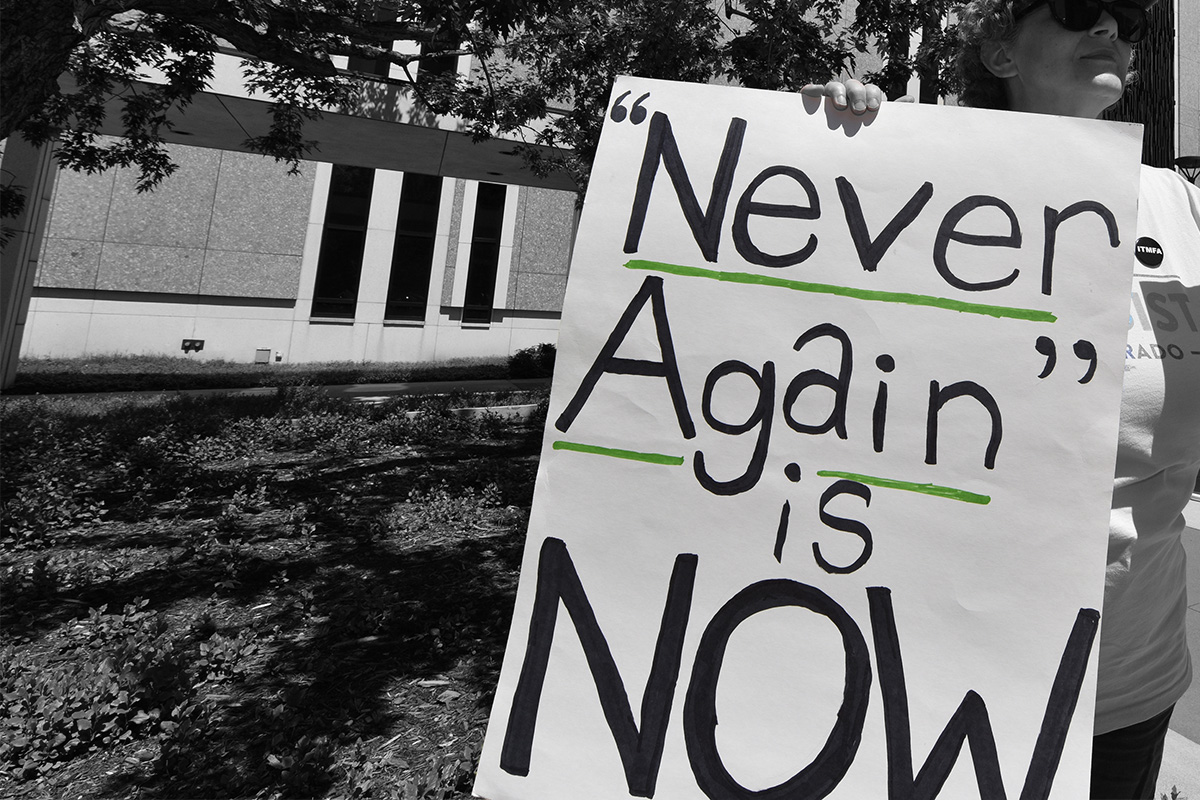I grew up in Boca Raton, Florida, a suburb so Jewish that the entire school district of Palm Beach County gets Yom Kippur and Rosh Hashanah off from school. Yet, even in Boca Raton — the kind of place where you spend each weekend of your middle school life at another bat mitzvah — the principal of the local Spanish River High School recently wrote in an email to a parent: “I can’t say the Holocaust is a factual, historical event because I am not in a position to do so as a school district employee.”
The principal was later demoted and relegated to an administrative position, and the Palm Beach County School District denounced his commentary as “offensive.” Still, it is not easy to reverse the damage that occurs when an educator validates the opinions of anti-Semitic Holocaust deniers.
At the public schools I attended in Palm Beach County, it was quite routine for survivors to visit our classrooms, reliving their traumas again and again in order to teach us to resist injustice and to recognize the signs of an impending shoah (Holocaust). In Jewish communities, we learn from a young age that humanity has the capacity for destruction. For us, the Holocaust never felt like a distant memory, because survivors were among us: They were the grandparents of our classmates, our neighbors. It felt real, because it is.
Now, as police brutality rages on without consequence, and Border Patrol leaders hold migrants in conditions so inhumane that they are compared to concentration camps, we must remind ourselves of how we felt the first time we first learned about the Holocaust — how when we were young, we vowed “Never Again,” and meant it.
I witnessed a Holocaust survivor give testimony for the first of many times when I was in fourth grade. After, I lied awake at night, imagining what would happen if a Nazi were to wrench me from my home and sentence me to an unthinkable terror. I begged my parents to let me sleep in their bed, fearful that in the middle of the night, we could be separated forever.
“It’s in the past,” my parents told me, groggy from being shook awake in the wee hours of the morning. “It won’t happen again.”
Of course, my parents just wanted me to calm down and go to sleep, but what they told me was wrong. Such horrors of humanity are not relics of the past. I can’t help but wonder what parents might say now, over a decade later, when their children crawl into their beds in the middle of the night, afraid of separation at the hands of a ruthless regime.
Over the last week and a half, thousands of Jews have urged for the defunding of ICE as part of the grassroots Never Again Action. One of the group’s organizers, Alyssa Rubin, said to HuffPost, “We have a responsibility as a people whose history included these kinds of atrocities to identify the signs and prevent them from happening.”
As a scared fourth grader, wide-awake in the middle of the night, I wondered how we allowed the Holocaust to happen — how people can be so cruel to one another. In a college seminar on literary representations of the Holocaust, I continued to wonder. Now, I ask the same questions as we learn more about the conditions of migrant detention centers like that of Clint, Texas, where scabies, shingles, and chicken pox are rampant, where sick children are quarantined together in a cell with no toilet, where some migrant children have even died in custody. I ask how it is possible, during a time when our own government is guilty of crimes against humanity, that a high school principal can deny the existence of a political system that killed millions of people just 70 years ago.
Sometimes, even when we think we know the answers, we continue to ask the same questions again with the hope that, this time, we might understand. But even when we cannot understand why, we can study history to understand how. As Auschwitz survivor Primo Levi writes in The Reawakening, “If understanding is impossible, knowing is imperative, because what happened could happen again.”
Still, President Trump refers to reports of disease, hunger, and abuse at the border as a “hoax.” It’s not too different from a high school principal doubting the evidence that the Holocaust is a “factual, historical event.” When women in migrant detention centers tell visiting Congress people about the psychological warfare deployed against them, their personal testimony isn’t taken seriously. Similarly, despite the wealth of recorded Holocaust testimony, educators in our country can still deny the genocide as historical fact.
Our greatest weapon against injustice is our knowledge of how to fight back. When we learn about genocide, we inevitably ask ourselves difficult questions: What responsibility do we, as individuals, have in protecting each other from injustice? What does it mean to be a bystander, and how do we know when it’s time to intervene?
I mourn the deaths of the Jews, the disabled, the gay men, and the others who were killed by the Nazis, knowing that if I lived in Europe in the 1930s, it could have been me. But, my Holocaust education taught me that it doesn’t matter that it could have been me. What matters is that it could have been any human being. Even when we are not personally in danger, it remains our responsibility to serve as defenders of basic human rights.
It’s not just the Jewish thing to do. It’s the human thing to do.
Header image via Tom Cooper/Stringer/Getty Images



